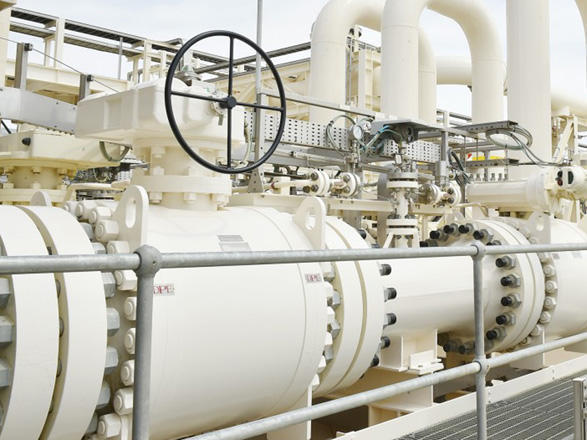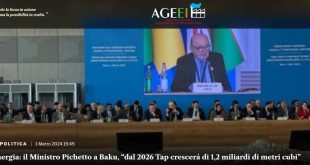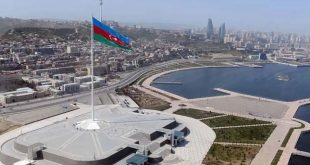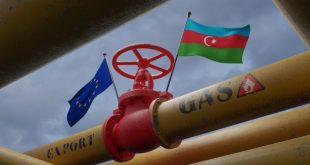
Southern Gas Corridor, the European Commission’s project to take Caspian Sea gas to Europe, was officially completed last month, securing Azerbaijan’s position as a reliable energy provider to Western countries.
The Southern Gas Corridor is expected to strengthen regional stability, as well as economic, political and geostrategic cooperation.
The project consists of the Trans Anatolian Natural Gas Pipeline (TANAP), Trans Adriatic Pipeline (TAP) and South Caucasus Pipeline and has an initial output volume of 16bcm of gas.
With a length of 3,500 km, Southern Gas Corridor is one of the world’s largest infrastructure projects that will transport gas from Azerbaijan’s giant Shah Deniz field to European markets.
In last days of 2020, Azerbaijan started commercial gas supplies to Europe through the Trans-Adriatic Pipeline, which helped achieve the strategic goal of the Southern Gas Corridor.
The main supply source of the corridor is the Shah Deniz field, which is among the world’s largest gas-condensate fields, located in the Caspian Sea.
The completion of the project was officially announced during the 7th Ministerial Meeting of the Southern Gas Corridor Advisory Council on February 11.
The Joint Declaration on Southern Gas Corridor was signed between the European Commission and Azerbaijan in 2011. Since then, Azerbaijan has shown full commitment to the project. Azerbaijan also invested 10bn dollars in all four segments of the Southern Gas Corridor, including Shah Deniz, South Caucasus pipeline, TANAP and TAP.
The cost of the project initially was planned to be $44.6 billion, but due to efficiency in management and proper planning, the cost was reduced to $33 billion.
Azerbaijan Energy Minister Parviz Shahbazov has said that through the project, it is planned to export about 1 billion cubic meters of natural gas to Georgia, at least 8 billion cubic meters of gas to Turkey and over 5 billion cubic meters to Europe in 2021. Additionally, 13 percent of natural gas are planned to be delivered to Italy, 20 percent to Greece and 33 percent to Bulgaria via TAP, which is one of the mains segments of the Southern Gas Corridor.
Being the first project to transport gas from the Caspian Sea region to Europe, SGC will provide energy security for Europe and guarantee demand for Azerbaijani gas. In addition, it will lead to further development of cooperation between the countries involved in the project.
Azerbaijani President Ilham Aliyev, during the 7th Southern Gas Corridor Advisory Council Ministerial Meeting, described the SGC as a project of energy security and energy diversification.
“Energy security today is a matter of national security of all the countries and energy diversification also is important for consumers as well as for producers. Therefore, I think we have a very unique format of cooperation, a very properly measured balance of interests, where interests of producer Azerbaijan, transitors, consumers coincide. And these make it possible to implement these projects which for some seemed to be not very realistic,” the president added.
Moreover, the project will create ample opportunities to increase production at existing fields, and give impetus to the discovery of new ones. This corridor can also play an important role in the implementation of production volumes at the joint Azerbaijani-Turkmen Dostlug field.
EU Commissioner for energy Kadri Simson said during the 7th Southern Gas Corridor Advisory Council Ministerial Meeting that the Southern Gas Corridor helps the EU to diversify its energy supply and offers the citizens more choice and more competition.
“In fact, in Italy, we are already seeing decreases in gas prices at the beginning of the year. Our success also means the beginning of a new partnership. With the Corridor, the EU and Azerbaijan are now strategic energy partners,” Simson said.
Commissioner for Neighbourhood and Enlargement Olivér Várhelyi emphasized that the Southern Gas Corridor has been a part of the Eastern Partnership policy agenda “20 deliverables for 2020”.
“We are now fully engaged in elaborating a plan to implement these priorities – with real targets and objectives. The work done for the Southern Gas Corridor is an inspiration in this context. Strengthening transport and energy connectivity and security of supply supports the resilience of our economies,” he said.
Likewise, Turkish Energy and Natural Resources Minister Fatih Donmez stressed that the Southern Gas Corridor will benefit the entire region and will become the basis for regional cooperation.
British Prime Minister’s Trade Envoy to Azerbaijan Baroness Emma Nicholson stated that the Southern Gas Corridor has become a symbol of energy diversification, security and strength across Europe, as a result of the joint efforts of Azerbaijan and its partners.
BP’s Regional President for Azerbaijan, Georgia and Turkey Gary Jones, during the same meeting, highlighted Azerbaijani President Ilham Aliyev’s role in the implementation of this historic project.
“His personal efforts have played a crucial role in the successful implementation of the project which has become one of the most challenging projects in the global oil and gas industry. BP is immensely proud to have been involved in all phases of this project, which benefit people in the region and Europe for decades to come,” Jones said.
Head of the EU Delegation to Azerbaijan Kestutis Jankauskas has said that the Southern Gas Corridor is a very good example of cooperation between Azerbaijan and the European Union. Jankauskas stated that the EU is currently looking for ways to further develop the cooperation with Azerbaijan over the Southern Gas Corridor.
“We discuss and agree on priorities, projects and work together to implement them. There has been very good cooperation in the energy field, and EU and Azerbaijan are strategic energy partners,” he said.
Azerbaijan has turned into a reliable transit country for the transportation of energy resources from the Caspian Sea. The Southern Gas Corridor further strengthens Azerbaijan’s energy security and diversifies markets, sources and routes for consumer countries.
By Ayya Lmahamad
 Oval Useful news from Azerbaijan and Caucasus
Oval Useful news from Azerbaijan and Caucasus


